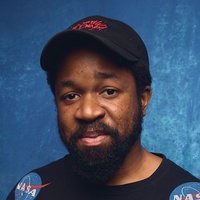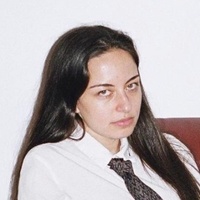On embracing trial and error
Actor, writer, and comic entertainer Ikechukwu Ufomadu discusses living on the edge of existence, being honest on stage, and comedy as a public service.You have a very singular style—a kind of deadpan, authoritative comedic voice. I was wondering whether that came about organically or whether that was a strategic choice?
It was developed organically. There wasn’t much thinking beforehand of, “the market is lacking this kind of thing, so let me try and make that thing.” I went to school to study theater and acting, and was preparing for this life of, “Okay, I’m going to be a stage actor and that’s what I want to be. I want to perform in plays.”
I think by the end of my time in school—I remember I was watching Letterman, and I didn’t grow up watching late night TV. I just found it fascinating. At the time I was in an experimental downtown New York theater scene, and so was used to doing projects that were deconstructing the act of performing on stage. Watching Letterman, watching this person who has to wear a suit every single night and has to sit down at a desk, and is doing so in front of this studio audience, when what he wants to do is be funny and play around—it just kind of struck me as interesting. Actually kind of weird, but then at the same time, so accepted across the country.
It’s a very, very odd corporate job that he has. I was really fascinated, too, by the fact that he’s playing himself—it’s him on stage, and he goes by David Letterman on stage, but obviously it can’t exactly be him because he’s on stage in front of all these people.
Have you been trying to find the performing version of yourself, rather than another character? Like, the David Letterman who hosts The Letterman Show is not the private David Letterman in his home. He is the performing David Letterman. Right?
Yeah, and thinking about how subtly the knobs need to be switched to actually become a different person, performing self. There I am, backstage, and then I go on stage. Just the mere fact of having a microphone and standing in front of people does something, it opens up different ways of playing around with the audience.
You mentioned being in school and studying theater and acting, and I know you’re a writer as well. Can you tell me about the different creative identities that you inhabit, be it comedian, writer, or actor?
Throughout middle school and high school I did both theater and speech, and was mostly acting in other people’s material, plays and otherwise. But it wasn’t until 2010, I had done this dance theater intensive in Bali—it was a bunch of heavy dancing and movement training. For some reason, coming out of that, I felt like my comedic sensibility was something valid that could be explored on stage or in front of people. I think before then, that sensibility was always there: joking with friends or doing more creative personal projects that were a little uncategorizable. But after that dance intensive for some reason I was like, “Oh, yeah, this comic person sensibility is something I could explore in a bigger way.”
Then over the course of the pandemic, I started embracing writing more. Just curious if I could make comedy that could be funny on the page. Up to 2020 in performing my own work, I’d only really written down the bare bones notes that I just needed for myself in order to make it from the beginning to the end of a standup set.
Do you have any strategies for getting creative juices flowing when you’re feeling stuck or blocked? Like, with the dance intensive, did you feel like physical movement had something to do with accessing creative energy?
It’s a hard question. One thing that I feel I really connected with—I read Charlie Chaplin’s biography a few years ago, and he talked about where his ideas came from, how it was just this pure, unrelenting want for an idea. He just needed an idea, and so he just had to come up with an idea, and there was no way around this need other than coming up with an idea. Early on, when I was trying to figure out what to do at comedy shows, there really was just kind of this, “Okay, I need something. I need something. What am I going to do?” Just rallying of the neurons towards, “I need an idea to do on stage by tonight.” Rallying all of my mental and physical being to just come up with something—I guess it’s a sort of desperation, of having some kind of built-in deadline in the form of a show.
Can you give me an example of a time where you were really grasping for an idea at the last minute, and then what you came up with?
Yeah, one that comes to mind is, I was doing the show called Pop Show that Ziwe used to do. Still does, but I think in a different form now. The premise of the show was just, “You’re a pop star, so you have to sing a song as a pop star.” And so I remember that morning, I did not have an idea, and I really needed an idea.
So what did you do?
For some reason I’m really drawn to the old American entertainer archetype of the Rat Pack and the talk show, and American standards. In hunting for something, I guess I went back to that pool of inspiration. I really like very simple things. Taking something really familiar and shifting it somehow—making something really familiar feel kind of strange. The end result for that show was doing this version of the ABCs that was like a jazz rendition, going through the whole alphabet once, and then having the audience sing along, and then doing a scat version of the alphabet, and then going back and doing the classic rendition of it one more time before closing.
I don’t know if this would explain it either, but one time, in Steve Martin’s standup memoir he was talking about being on the Tonight Show with Johnny Carson, and I guess apparently Carson had done this Goofy impression during the commercial break. Carson turned to Steve Martin and said, “You’ll use anything you ever knew.” There’s something about that, it feels hard to pin down. I guess I have some need to perform. I don’t know exactly why. Then the question presents itself, “Okay, well, what are you going to do?” I think there’s some kind of underlying desire to somehow serve the audience or to present something that will be of value to their life, but also at the same time, that it will be valuable to my life, that there’s some kind of mutual value that can be created from this encounter between a performer and the audience.
My idea of the sort of old-school entertainer or old-school talk show host, is that you’re almost doing a public service in a way. Your job is to show up and to deliver humor somehow to the group of people who have assembled at this event or in front of the screen. Like, say I’m a milkman and I’ve got to deliver the milk. If you’re the milkman, I guess you’ve got to find some milk to deliver. I’m sure if you’re a milkman, it’s not a very complicated process—you probably have a stable pipeline to get the milk that you need, but with the comedic entertainment, you’re always trying to find the milk.
On the one hand, I do like using material that everyone can really relate to, and sort of playing with that. Then, I also like doing things that not everyone will understand at first, or the understanding kind of plays out over time. Where it almost feels like you’re creating an inside joke for the first person who laughs, and then maybe over the course of the joke, everyone has now figured out why a particular bit was funny, so we’re all sharing in the joke.
One of the first bits I did was this Obama voice, where I would just get up to the microphone and say Malia several times, in Obama’s voice. Because there was no introduction, nobody really knew what I was doing. Then I guess the punchline was when I would go, “Malia, Malia, Malia—Sasha. Sasha, Malia’s trying to speak. Sasha, Malia’s trying…”
There’s something about that time that’s appealing, suspending confusion before you let people understand?
Yeah, it’s an interesting tension between wanting people to understand what’s going on, but also I like creating little puzzles that are figured out over the course of a set. I got really into crosswords three years ago. I don’t know if you do crosswords, but it’s a funny phenomenon, where you’re working on a crossword and you think you don’t know the answer, and then either you step away from the crossword, or just in working on another part of the crossword, you go back to the part that you didn’t get, and you suddenly are like, “Oh, right. Yeah. That’s the answer.” It’s this concrete feeling of, “Oh, a piece of my brain was working on this while I was focused on something else.” I like making these little comedic performance puzzles that perhaps sometimes aren’t understood at the get, but over time are like, “Oh, okay, I see what’s going on here.”
So you’re not just looking for laughs, you’re giving people a puzzle to solve so that they can have that feeling of pleasure when they’ve gotten it?
Yeah, I guess. Another example is, I tend to do a lot of voices. I’ll vary the way that I speak—otherwise known as impressions, but I’ve always been resistant to announce that I’m doing an impression. A couple of months ago, I was thinking about this again. I was like, it would be so easy to just tell the audience, “Hey, I’m speaking like this person now,” and then they would know that that’s who you’re speaking like, and then they would enjoy that. Instead, I’ll start into voices unannounced, and I’ll be following maybe the same train of thought that I was before, but with that voice, perhaps that thought is inflected in a different way.
I’ll talk like Obama from time to time, and I’ll do it whenever I feel like I need to be a little more thoughtful, whenever I’m naturally moving in a more sort of thoughtful, deliberative train of thought. I’ll just talk in that way, but then, if I kind of want to be a little looser or something, I’ll just start talking in this more stereotypical Texan cowboy voice. I don’t want to sound too highfalutin, but it’s almost like the feat of the impression is not the point, exactly, but maybe it’s highlighting the frame of mind that the voice usually occupies. I only use them as a tool to express my thoughts somehow.
A recent example is there was a show where I opened up the floor for questions, and an audience member asked, “What did it feel like to lose the Emmy?” I reached for the Obama voice because that seemed an answer that needed some kind of diplomacy, a level head. It’s almost like a way to be kind of sincere in responding, but also still playful.
In that moment, did you feel obligated to be honest? Do you feel like you owe the audience honesty?
I don’t know. I try to be honest on stage. I’m not an open book, but I do try to be honest, and try to achieve a playful honesty. There’s a form of honesty that’s maybe, “Does what you just said line up with what I’ve read on Wikipedia about you? Does this line up exactly? Are you being honest with me?” Then there’s also achieving a level of playfulness or release or fun—I think one can be honest in their pursuit of those qualities. Sometimes I guess that requires finding different ways of playing around—I’m not trying to pull the wool over anyone’s eyes while performing.
What advice would you give to someone who maybe is not very embedded in a creative community and doesn’t feel like they have a lot of momentum for their creative work, but is trying to kind of facilitate that?
Let’s see. Advice.
I’m debating whether this is advice or whether I’m just saying what my particular path was, which might not be applicable to everyone. But a big part of finding a community was trial and error. Getting up and, in my case, going to open mics, and through trial and error, finding not exactly like-minded, but finding—it felt like peers.
Looking for your people?
Looking for your people. Yes, that’s exactly what I’m trying to say. Embracing the trial and error nature of that process. I think that maybe that’s the helpful thing, to take a long view in embracing trial and error. Just so you’re not frustrated if things don’t come together right away, or think that today’s results are indicative of how the future will also play out. I think there’s maybe some agency there, not letting just your immediate circumstances or immediate environment cloud your view of what’s possible or what could potentially happen. I wouldn’t advocate living in a bubble or ignoring reality, but not letting one failure discourage you too much, not letting a setback color one’s view of how things will play out.
Each day is new, literally, and also hasn’t happened yet. I find myself telling myself that, particularly when I’m trying to do something new, because it’s easy to forget. Even if I were performing tonight, to remind myself that tonight’s show has not actually happened yet often feels revelatory. Like, “Oh, it hasn’t happened.” Whatever I’m thinking the show will be like, it actually hasn’t happened yet. I haven’t arrived there. I haven’t seen the crowd, I haven’t felt the atmosphere in the room yet. I could do a completely different thing, completely different material than what I’ve set out to do. It literally hasn’t happened and will be happening in the future. There’s something about reminding myself that I’m living on the edge of existence at this moment, it seems to open up some kind of opportunity to do something new, or for a different result to arise.
Ikechukwu Ufomadu Recommends:
Watching or listening to Howard Cosell’s introduction of Frank Sinatra’s “The Main Event” concert
PBS’ American Masters documentary on Marian Anderson
15 minutes a day of loose, free-form, improvisational dancing
A visit to the FDR Presidential Library and Museum
Listening to Newton Minnow’s speech “Television and the Public Interest”




